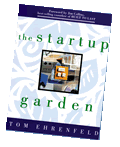
Entrepreneurial Integrity Most business publications aspire to be like the companies they cover. Unfortunately for the Industry Standard, chronicler of the dot-com bubble, it succeeded. The new book Starving to Death on $200 million: The Short, Absurd Life of the Industry Standard by former Standard editor James Ledbetter shares a nice if slightly disingenuous account of how the magazine fell prey to the same mania as its poster boys. I recommend it. Reading the book raised for me the issue of Entrepreneurial Integrity (EI): the ability of gurus or companies to live by the principles they espouse. In my case, EI comes down to one simple question. Do I actually run my business, and my life, by the practices that I recommend in my book? Believe you me, itís not easy. While Iíve never believed that one should literally run oneís life as a business (to be always "bottom-line oriented," for example,) I also believe that the core practices of good business do apply in life. One should always make good on promises, meet the needs of others, and "add value" on whatever sphere you care to consider. Moreover, I believe that one should animate a business with the same spirit, passion, purpose, productivity, and presence that one should have in life. This means that the lessons of business can and do cross over into our daily lives. Even some artists seem to share this point of view. One of the characters in Whit Stillmanís film Barcelona is obsessed with Peter Drucker, reflecting a passion of the filmmakers. In an interview with Inc. some years back, Stillman said of Drucker: "One of the main things thatís influenced me is his notion of doing one thing at a time. He pokes fun at people who are executive Mozarts, who think they can do everything at the same time." I also see deeper resonance in Druckerís The Effective Executive, especially in his argument that effectiveness, which applies to all human realms, can be learned. This comes from being conscious of how you use your time, leveraging your natural strengths, prioritizing, and learning to make better decisions. Why does personal productivity matter so much? Because, I suppose, a deeply creative impulse lies at the heart of entrepreneurship. And if you canít deliver on the promise of your vision than nothing else matters. Maybe thatís why Iím a sucker for books on the art of getting things done. Unfortunately I tend to read them more than practice their ideas. Which is a shame: for when I do get in the groove and produce, the art of productivity reveals itself as a discipline that transcends business. And so I recommend a couple of books. Getting Things Done: The Art of Stress-Free Productivity by David Allen delivers smartly on the promise of the title. Allen shows you how to take action on the most important things, rather than clutter your brain with distracting longings to take care of lingering "stuff." And he shows how productivity is ultimately tied to deeper personal longings, how it speaks to our participation in the world. Finally, he's got an appealing website that does what he recommends. And okay, Iíll confess to finding applicable wisdom in Stephen Coveyís The Seven Habits of Highly Effective People. Ultimately, productivity is really about presence (what Mihaly Csikszentmihalyi calls Flow.) It speaks to your attention and participation and creativity in the world. In that spirit Iíll close with a passage from a favorite book of mine, Zen Mind, Beginnerís Mind by Shunryu Suzuki. This beautiful book shares this same message Iím preaching, and practicing, though it does so from an entirely different perspective. "In order not to leave any traces, when you do something, you should do it with your whole body and mind: you should be concentrated on what you do. You should do it completely, like a good bonfire. You should not be a smoky fire. You should burn yourself completely. If you do not burn yourself completely, a trace of yourself will be left in what you do. You will have something remaining which is not completely burned out. Zen activity is activity which is completely burned out, with nothing remaining but ashes." Comments
Post a comment
|
Recent Writing Flow as the Grand Unifying Theory of Productivity Lowering the Personal Entrepreneurial Threshold Good Writing Begets Good Writing
THE BOOK
Read or print the Intro and
Read some book reviews at Inc, 1-800-CEO-READ, and the Miami Herald. Read the publisher's press release. Visit the companies that Tom discusses in the book Hear a recent lecture by Tom on the Startup Garden STARTUP RESOURCES Read about other books and web sites about starting your own business. TOM'S WRITING Just Managing – articles that Tom wrote for The Industry Standard and some Business Articles written for Inc., Fortune Small Business, Harvard Management Update, and other places. BUY THE BOOK To buy directly from me, simply go to Paypal and send 15 bucks to Tom@startupgarden.com. I'll take care of the rest. If you have any questions, email me at that address. |
| © 2001-2003 Tom Ehrenfeld | Site design by Tim Swan | |
